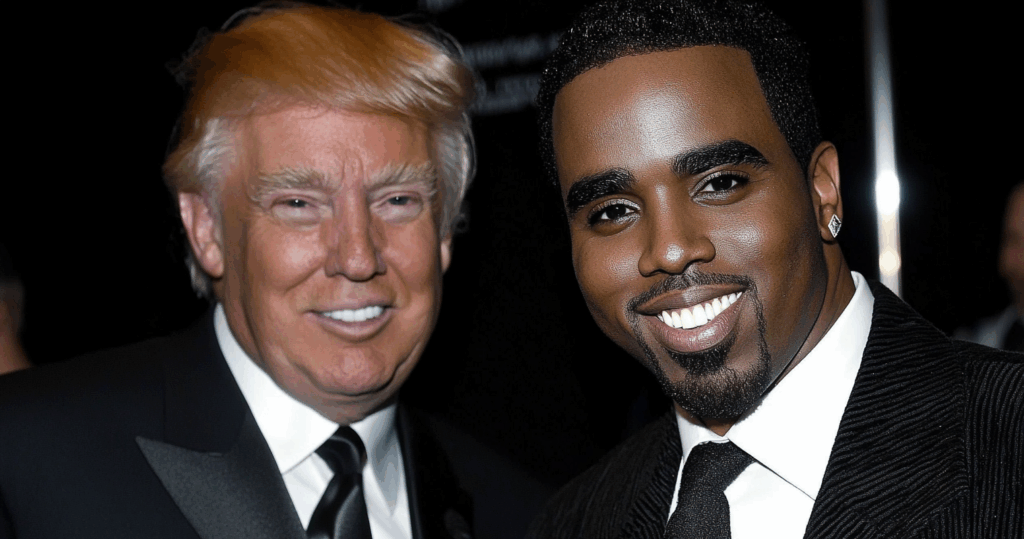President Donald Trump's recent pardon of reality TV stars Todd and Julie Chrisley has added momentum to speculation about his willingness to extend clemency to other high-profile entertainment figures. The Chrisleys, who starred in the USA Network series “Chrisley Knows Best,” had been serving federal prison sentences for tax evasion and bank fraud before Trump commuted their sentences as part of his broader celebrity pardon initiative.

Todd Chrisley was released after serving less than two years of his 12-year sentence, while Julie Chrisley was freed after serving approximately 20 months of her seven-year term. The couple's release, announced alongside pardons for other celebrities including rapper NBA YoungBoy and Chicago gang leader Larry Hoover, signals Trump's continued use of presidential clemency powers to benefit prominent figures from the entertainment world.
This pattern of celebrity pardons has now set the stage for potentially even more controversial clemency decisions, including the possible pardon of Sean “Diddy” Combs, who faces far more serious charges including racketeering and sex trafficking that could result in a life sentence.
NBA YoungBoy (real name Kentrell Gaulden) was pardoned by President Trump for gun-related charges after being sentenced by a federal judge in 2024 to just under two years in prison for possessing weapons despite being a convicted felon
The Current Legal Storm
Sean “Diddy” Combs sits in a Brooklyn federal detention facility, his once-glamorous life reduced to the confines of a jail cell as his racketeering and sex trafficking trial unfolds in Manhattan federal court. The hip-hop mogul, who built an empire spanning music, fashion, and spirits, now faces the possibility of spending the rest of his life behind bars. The trial, which began on May 5, 2025, represents a dramatic fall from grace for one of entertainment's most powerful figures.
The charges paint a disturbing picture of alleged criminal enterprise spanning years. Federal prosecutors accuse Combs of running a racketeering conspiracy, engaging in sex trafficking, and transporting individuals across state lines for prostitution. If convicted on the most serious racketeering charge, he faces a potential life sentence, with a mandatory minimum of 15 years for the sex trafficking allegations alone. Since his arrest in September 2024, Combs has maintained his innocence, pleading not guilty to all charges.
An Unexpected Lifeline
In a surprising development that has captured national attention, President Donald Trump recently indicated he would consider pardoning Combs if requested. During a White House press briefing on Friday, Trump told reporters that while no one has formally asked him to pardon the music mogul, he would “certainly look at the facts” of the case. The President's comments came with a notable personal touch, mentioning that Combs “used to like him” and emphasizing that pardons are “not a popularity contest.”
Trump's openness to clemency represents a potential escape route from federal prosecution for Combs, though the path to such relief appears far from guaranteed. The President's statement suggests a willingness to engage with the case on its merits, rather than dismissing it outright. This approach aligns with Trump's broader pattern of celebrity pardons, including recent clemency grants to figures like Larry Hoover, NBA YoungBoy, and reality TV stars Todd and Julie Chrisley.
Behind-the-Scenes Maneuvering
The possibility of a Trump pardon hasn't emerged in a vacuum. According to sources familiar with the situation, longtime Combs associates have spent months cultivating relationships with Trump administration officials, laying groundwork for potential clemency pleas. This organized lobbying effort suggests a coordinated strategy to position Combs favorably should his trial result in conviction.
The timing of these efforts proves particularly strategic, occurring as Combs' trial progresses and the possibility of conviction becomes more concrete. Those working on his behalf understand that presidential pardons for federal crimes represent one of the few absolute powers granted to the executive branch, capable of wiping away criminal liability entirely.
The Scope and Limitations of Presidential Clemency
A Trump pardon would provide Combs with complete relief from federal criminal prosecution, effectively ending the government's case against him regardless of trial outcome. Presidential pardon power extends to all federal offenses, and precedent exists for both pre-conviction and post-conviction clemency. President Gerald Ford's pardon of Richard Nixon established that pardons can be granted even before charges are filed, while Trump's previous clemency grants, including the pardon of campaign chairman Paul Manafort, demonstrate his willingness to exercise this authority for high-profile figures.
However, the relief a federal pardon provides comes with significant limitations that would leave Combs facing continued legal jeopardy. Presidential clemency power extends only to federal crimes, meaning any potential state charges would remain beyond Trump's reach. More importantly for Combs, a federal pardon provides no protection against civil lawsuits, which represent perhaps his greatest ongoing legal threat.
A Mountain of Civil Litigation
Even if Trump grants Combs a full pardon, the music mogul would continue facing what legal experts describe as an avalanche of civil litigation. Recent reports indicate that Sean Combs confronts an additional 120 sexual abuse lawsuits set to be filed in the coming weeks, adding to an already substantial number of civil cases seeking monetary damages.
These lawsuits paint a disturbing pattern of alleged misconduct spanning decades. Recent filings accuse Combs of raping women, sexually assaulting men, and molesting minors, including shocking allegations involving a 16-year-old boy. Some cases specifically target his role in MTV's reality series “Making the Band,” with four separate lawsuits detailing alleged misconduct during auditions and appearances on the show. Other accusations involve grooming and coercing minors as young as 10 years old, representing some of the most serious allegations in the civil litigation.
Unlike criminal cases, civil lawsuits operate under different legal standards and seek financial compensation rather than imprisonment. Plaintiffs in these cases need only prove their allegations by a preponderance of evidence, a lower standard than the “beyond a reasonable doubt” requirement in criminal court. For Combs, this means that even a presidential pardon clearing him of federal criminal liability would leave him exposed to potentially hundreds of millions of dollars in civil damages.
Limited Options for Counter-Attack
Should Combs receive a presidential pardon, his ability to launch successful legal counter-attacks against his accusers would remain severely constrained. While he could theoretically pursue malicious prosecution claims against federal prosecutors, such cases require proving that charges were filed without probable cause, an extraordinarily difficult legal standard to meet. Given the extensive investigation that preceded his indictment, success in such litigation appears unlikely.
Defamation lawsuits against accusers represent another potential avenue, but Combs would face significant hurdles as a public figure. Legal precedent requires public figures to prove “actual malice” in defamation cases, meaning they must demonstrate that false statements were made with knowledge of their falsity or with reckless disregard for the truth. This higher standard of proof makes successful defamation litigation challenging for celebrities and public figures.
Civil rights violations against law enforcement during his detention could provide another legal avenue, though such cases typically yield modest financial recoveries and would do little to address his broader legal challenges. Business interference claims against parties who damaged his commercial relationships might offer some relief, but would require proving specific economic damages and intentional misconduct.
The Strategic Calculus
If pardoned, Combs would likely focus his efforts on damage control and business recovery rather than aggressive litigation against accusers. Public relations campaigns aimed at rebuilding his reputation would become essential, along with attempts to restore damaged business relationships and partnerships. His entertainment empire, built over decades, has suffered significant harm from the criminal charges and accompanying publicity.
Settlement negotiations with civil plaintiffs would probably represent his most practical approach to resolving the mounting litigation. While potentially expensive, negotiated settlements could help limit his financial exposure and reduce ongoing negative publicity. Asset protection strategies would become crucial to preserving wealth for both settlements and continued legal defense costs.
The international expansion of business operations might offer opportunities to rebuild his commercial empire in markets where reputational damage proves less severe. However, the global nature of modern media and the serious nature of the allegations suggest that geographic distance alone would provide limited relief.
Political and Public Implications
Trump's willingness to consider pardoning Combs carries significant political implications, particularly given the serious nature of the charges involving sex trafficking and alleged abuse of minors. Public reaction to such clemency would likely prove intense, with advocacy groups and political opponents seizing on the decision as evidence of favoritism toward wealthy celebrities.
The timing of any potential pardon decision would prove crucial. A pre-conviction pardon might appear to circumvent the judicial process, while waiting for a conviction could make clemency seem like a response to public pressure. Trump's previous pattern of celebrity pardons provides some political cover, but the specific allegations against Combs present unique challenges.
The Road Ahead
Whether or not Trump ultimately grants clemency, Combs faces a fundamentally altered future. His business empire, personal relationships, and public legacy have all suffered severe damage from the criminal charges and accompanying revelations. A presidential pardon might eliminate the threat of federal prison, but it cannot restore his previous position in the entertainment industry or shield him from continued civil litigation.
The coming weeks will prove crucial as his criminal trial continues and the possibility of conviction becomes clearer. Behind the scenes, his legal team and associates continue working to position him favorably for potential clemency while simultaneously preparing for the lengthy civil litigation that will continue regardless of criminal case outcomes.
For Sean “Diddy” Combs, a presidential pardon would represent a significant victory in avoiding federal prison, but it would mark only the beginning of a long journey toward rebuilding a shattered reputation and resolving massive civil legal exposure. The music mogul who once commanded respect and fear in equal measure now finds himself dependent on the mercy of a president and the calculations of civil attorneys seeking justice for their clients.



















